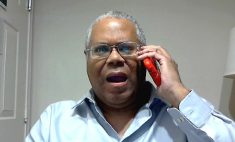What’s Good For The Goose… Business Ethics
Posted by Mitch Mitchell on Sep 18, 2019
Some time ago I received a call from someone who said they'd like to talk to me about maybe doing some work with them; I like calls like that. As we started discussing things, I started wondering if I was speaking to someone who actually knew what he was talking about. The way the questions were coming to me was different than how I'd ever had anyone ask me before about something I know pretty well.
 |
Once we got through the preliminaries the guy started asking a lot of questions that had to do with me and my background instead of the work I do. At first I wasn't bothered because, after all, if someone's going to pay you money for something you figure you can answer a few questions. As it went on though, I started feeling a little bit uncomfortable about the direction things were going. I was being asked for things that I'd never been asked before, and for proof of things that no one had ever questioned me on before.
Feeling uncomfortable, I asked one of my peers about it. He said he'd heard of some of it, but the rest he thought was a bit strange. He asked me what I knew about the company and I said I didn't know anything about them.
A cursory internet review came up with nothing, and I'm great at internet research if I say so myself. My friend said I had earned the right after all my years in business to check up on someone for whom there was no information online; in this day and age, that's kind of strange.
I decided it was a reasonable course of action; after all, how could someone who was asking me for all kinds of information not want to answer any questions I had, right? So when I received the next email, I asked for a few references on his company because I wanted to ask other people they'd worked with about them. I was told I could see the company biography page on the website. I said that wasn't good enough since my own biography wasn't good enough for them; quid pro quo seems like a fair request.
That was the last I heard from the company. No email, no phone call, no "I don't want to do it". I mean, absolutely nothing. It's a terrible way to do business, and it certainly made the company look like they've either got something to hide or aren't trustworthy; at least that's how I read it. I don't know what happened to the company but a couple of years later their website was gone. Did I dodge a bullet or was I a contributory to their demise? Who knows.
In business, what's good for the goose is good for the gander. One can't expect every conversation to go in one direction, especially when it's a business to business transaction. Even with regular employment, I often tell people that the interview process is the only time that an employee is potentially on an equal footing with someone they're interviewing with. For entry level jobs that might not be the case, but for management level positions, especially if one has a nice professional pedigree behind them and, definitely if that person is already working, potentially new employees should be asking some tough questions back.
This all relates to treating people like professionals and acting like professionals. You always get what you put out.
If you want to work with someone and hope they represent you in a professional manor, you have to be ready to treat them the same way. I certainly would never ask a plumber for their certification if I had a leak or any other water problems in my house; I'd just want them to fix things as soon as possible.
There's a major business lesson here. When there's consternation in your feelings it needs to be addressed and verified. Whether I dodged a bullet or put off a potential client, in the long run I did what was legitimate as a business person. Anyone who questions that isn't playing the game fairly; no one needs to be treated unprofessionally.
What do you think?

